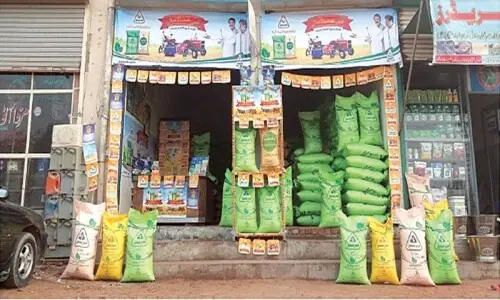THE current spell of monsoon rains has remained largely beneficial for kharif crops so far, except for areas where breaches occurred owing to the mismanagement of saline water drains by the irrigation authorities.
And there are further forecasts of rains.
However, the floodwater, which has inundated almost the entire katcha area from Guddu upstream to Kotri downstream, will improve soil fertility. And farmers will grow wheat in the winter once the water recedes.
Sindh’s agriculture officials said they earlier received complaints of pest attacks on cotton, with farmers going for repeated sprays. So the rains have come as a boon as they will wash out pests like jassid, thrips and whitefly
The availability of water remained largely satisfactory in the current kharif season, and even before the rains there were only a few complaints about water shortage from areas like the Naseer division in Mirpurkhas. The monsoon rains will not only do way with the issue of water shortage but also help eliminate pest attacks on the cotton crop.
The farmers consider one or two showers equivalent to two bags of urea for crops and orchards. The rains may pose the risk of discolouring and shedding, and the matured bolls may be damaged. However, it will be followed by a healthy flowering and fruit-setting. The next picking would make up for the initial damage.
Agriculture officials said they earlier received complaints of pest attacks on the cotton crop — which is being grown on 648,000 hectares (ha) against the targeted 650,000ha — with the farmers going for repeated sprays. So the rains have come as a boon as they would wash out pests like jassid, thrips and whitefly.
Meanwhile, crops like sugarcane and paddy — both high delta crops — are also set to benefit from the current rains. Around 85pc (635,000ha) of paddy’s sowing target (750,000ha) for the season has been achieved.
The accumulation of rainwater will, however, damage the crop in low lying areas due to non-existent or non-functional drainage systems. The paddy growers in upper Sindh had gone for late sowing of the hybrid variety to avoid the heat wave. Nurseries of local varieties had been prepared and transplanted on time.
And the rainfall has not been that heavy in upper Sindh, confirms Gada Hussain Mahesar, a rice grower and farmers’ representative from Larkana. “Even otherwise, after a long gap we got timely water flows to prepare our nurseries, and the transplantation also took place on time.”
Reports of recent damages to the paddy transplanted in some parts of Tando Mohammad Khan and Badin have been received. At this initial stage, the plant doesn’t usually attain sufficient height to sustain rainwater.
Nabi Bux Sathio says the cotton and paddy crops have been hit in low lying areas like Bulri Shah Karim, Golarchi and Badin taluka, as the saline water drains didn’t drain out the rainwater. “On an overall basis, the rains have been good for the crops,” he says.
Meanwhile, sugarcane has been sown on 313,000ha, exceeding the target of 300,000ha.
Farmers in lower Sindh say the onion, chilli and tomato crops have been badly hit. Dundi cut chilli would be affected as it usually faces post-rain diseases. Its hybrid variety is at the harvesting stage, while the dundi cut crop is still at the fruiting stage. A loss of around 15-20pc is feared for the dundi cut chilli crop in low lying areas.
Karamullah Saand, a grower from Mirpurkhas, said the losses to the chilli crop, mainly the dundi cut variety, are just being reported.
“The hybrid variety has some sort of resistance against diseases and it can sustain rainwater to some extent as well. So there are no chances of losses to the hybrid variety at this stage.
“But if the rainwater remains standing in the fields for a longer period, it will hit the hybrid variety too.” He adds that even the banana can be damaged if the water stagnates in the orchards.
The nurseries of onions and tomatoes have also been lightly hit. Tomato cultivation is quite scattered, while the sowing of onions has been partially delayed due to the rains. Its nurseries, prepared just before the rains, could not be transplanted in 10pc of the cases.
The growers believe that the crop would be delayed by a month as fresh nurseries would be prepared after the floodwater ebbs.
Onion nurseries are prepared in the riverine area, and the land in the katcha areas is currently under floodwater.
Before rains, a one-acre nursery was sold for Rs14,000-15,000, but post- rains the price has dropped to Rs4,000-5,000 as land in the katcha areas has been inundated and the transplantation delayed. Usually onion is transplanted after 35-40 days.
Published in Dawn, Economic & Business, August 10th, 2015
On a mobile phone? Get the Dawn Mobile App: Apple Store | Google Play































